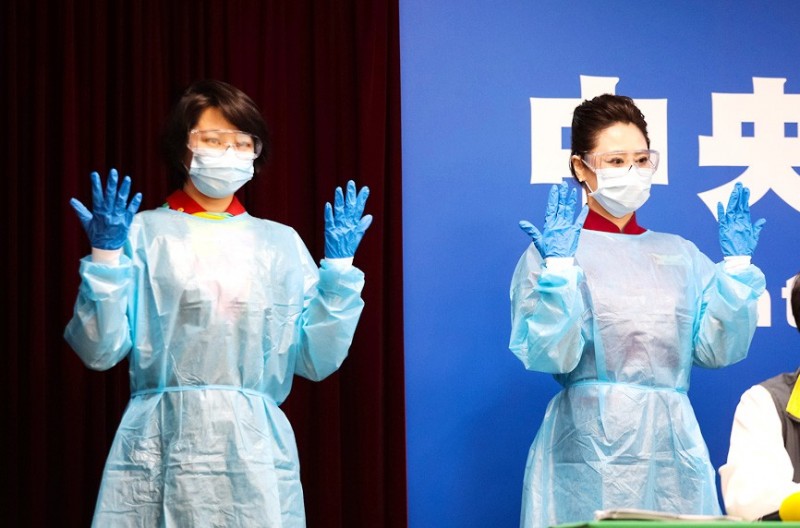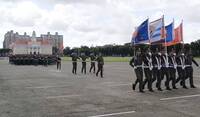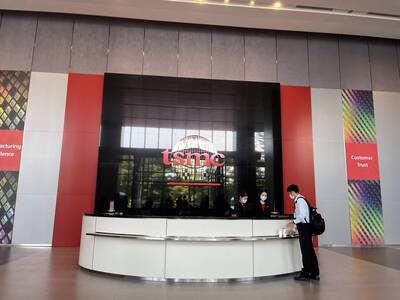《TAIPEI TIMES》 CECC reports 16 new virus cases

Two women at the Central Epidemic Command Center’s daily news conference yesterday demonstrate personal protective equipment that is to be distributed to all flight attendants. Photo: Central Epidemic Command Center via CNA
By Lee I-chia / Staff reporter
The Central Epidemic Command Center (CECC) yesterday announced 16 new cases of COVID-19, two of which were caused by domestic transmission whose sources are being investigated.
The new cases raised the number of confirmed cases in Taiwan to 283.
Neither people who contracted the virus locally had traveled abroad recently, said Minister of Health and Welfare Chen Shih-chung (陳時中), who heads the center.
The nation’s 268th case is a man in his 50s who developed a fever and respiratory symptoms from Feb. 28 to Wednesday last week, was hospitalized for a fever and pneumonia on Friday last week and discharged on Monday, Chen said.
However, he again sought medical treatment on Wednesday and was reported for testing, he said.
“The local health department has so far listed 102 people, including family members, coworkers and healthcare professionals, who had close contact with the man, and is carrying out an investigation to clarify the possible source of infection,” Chen said.
“As there was a long time between the onset of symptoms and confirmed diagnosis, the case might be more complicated,” he said.
Centers for Disease Control (CDC) Deputy Director-General Chuang Jen-hsiang (莊人祥) said that the other domestic case, the 269th, is a man in his 20s who on Monday developed symptoms including diarrhea and sought treatment at a clinic, where he was diagnosed with stomach flu.
On Tuesday, he sought treatment at a hospital for symptoms including a fever and was prescribed antiviral influenza drugs. He was reported for testing when he sought treatment again at the same hospital the next day, Chuang said.
Contact investigations are being carried out for the two patients, who are both residents of northern Taiwan, he said.
Chen said the criteria for reporting suspected cases in the initial stage include overseas travel history, but as there have been a few sporadic locally acquired cases, the criteria have been expanded, and the center encourages physicians to report any suspected cases with an unknown source of infection for COVID-19 testing.
The other cases who were confirmed yesterday are nine males and five females aged between 10 and 70 who returned to Taiwan between March 6 and Friday, and include two clusters of cases among Taiwanese studying in the UK and Spain, Chen said.
The imported cases had been to the US, Canada, the UK, Spain, Switzerland, the Czech Republic, Ireland, Australia and the Philippines mainly to work or study, he added.
Asked about the potential of aerosol transmission of COVID-19, CECC advisory specialist panel convener Chang Shan-chwen (張上淳) said that aerosols are a suspension of tiny particles finer than droplets that can remain airborne for longer periods, so the risk of contracting the virus by staying in the same place as an infected person is higher than droplet transmission.
The CECC’s guidelines for medical professionals who treat infected people include avoiding aerosol-generating procedures to prevent the possibility of transmission, he added.
While 14 percent of COVID-19 patients in China reportedly tested positive after recovery, the CECC allows a patient to be discharged only after testing negative in three consecutive examinations, adding that none of the 30 patients who have been discharged in Taiwan have tested positive again.
Meanwhile, as some flight crew members have tested positive for COVID-19, the center now requires all flight crew members to wear protective clothing, goggles, gloves and a mask during flights, and use separate restrooms from passengers, CDC physician Su Chia-ping (蘇家彬) said.
The disease prevention gear would be provided to airlines by next month, he said, adding that the center is also drafting guidelines for flight passengers.
新聞來源:TAIPEI TIMES

















